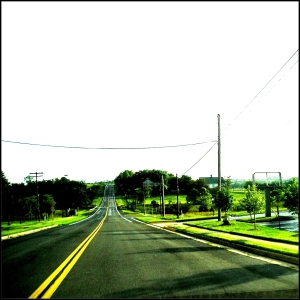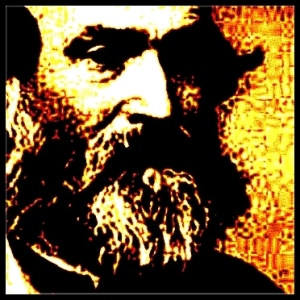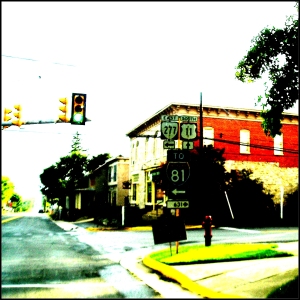 The words going through my mind at that moment were, “You don’t want to walk and talk about Jesus, you just want to see his face.” We were going south on Rte 11, the alternate to sharing the road with the convoys of trucks on 81 that are desperately and dangerously trying to deliver their loads on time. We’d passed by the Trinity Quick Lube in Winchester, whose flashing yellow sign declared, “Believe in the Power of Prayer.” And we knew that when we reached the stretch where Rte 11 becomes the 116th Infantry Regiment Memorial Highway, and where the Christian auto body shop towers over the other buildings on the block, that we’d be somewhat close to our destination. Or would it mean that we’d gone too far and that we were, in fact, lost?
The words going through my mind at that moment were, “You don’t want to walk and talk about Jesus, you just want to see his face.” We were going south on Rte 11, the alternate to sharing the road with the convoys of trucks on 81 that are desperately and dangerously trying to deliver their loads on time. We’d passed by the Trinity Quick Lube in Winchester, whose flashing yellow sign declared, “Believe in the Power of Prayer.” And we knew that when we reached the stretch where Rte 11 becomes the 116th Infantry Regiment Memorial Highway, and where the Christian auto body shop towers over the other buildings on the block, that we’d be somewhat close to our destination. Or would it mean that we’d gone too far and that we were, in fact, lost?
But then halfway through Middletown, we were found. We’d just passed the Irish restaurant where the owner always seems to warmly greet all the other customers but us, when I saw a cop turn his lights on behind us. I thought that, OK, he just got a call, so I pulled over to get out of the way. But it turns out I’m the person he’s looking for.
I turn around to see that there are two cops in the car behind me. So we sit and wait for a few minutes, wondering what their story will be. As for my story, I already know what it’s going to be and what it isn’t going to be. And what I know is that it isn’t going to be the truth. Because telling the truth to a pair of small town cops who have nothing to do on a quiet Saturday afternoon is the sort of thing that will get you arrested—or worse.
And it’s not like you can trust city cops, either. I know a woman, a white woman, who was once questioned by the police in DC simply for riding in a car with her black boyfriend. As for her boyfriend, they didn’t spend much time asking questions. They simply threw him against his own car and immediately arrested him. They were nice to the woman, though, and one of them gave her a ride home since they were impounding her boyfriend’s car. And, on the way home he asked her out. She declined politely—because, after all, discretion certainly is the better part of valor, especially when you’re dealing with someone, anyone, who’s carrying a loaded weapon.
Besides, as an old family friend—an attorney who knew DC cops very well—once said to me, “Never trust the police.” Of course, it’s not like they’re all corrupt. Here in Front Royal, whenever we’ve had to deal with the police, they’ve been extremely helpful, as they were several times during the recent presidential election when our Obama signs were stolen and our house vandalized in the process. Each time, a policeman came promptly, asked us questions, gave us tips for deterring thieves and vandals and left us with the feeling that, yes, these guys were on our side.
But we weren’t in Front Royal, this time. We were in Middletown, Virginia, where during the Civil War, hot-tempered Confederate General Jubal A. Early met his own Waterloo, as it were. Early, like some people today, didn’t like what was happening in Washington. He also thought that the institution of slavery was the best way to deal with what he saw as those “barbarous natives of Africa.” Indeed, it was Jubal Early who was most responsible for giving birth to the concept of the Lost Cause of the Confederacy, which held, among other things, that the ends of the Confederacy were noble, its leaders chivalrous, and that the institution of slavery was basically good for African-Americans. It’s a concept that lives on today whenever someone tries to tell you that, by God, some of the slave owners treated their slaves very well. And it’s a concept that lives on, of course, in even worse ways.
The trip that took us through Middletown that day started in Winchester, where we crossed that busy stretch of road that runs west to east through town. Named Jubal Early Drive, it’s a road we just about always have to take whenever we go to Winchester—which, because of the resources there, is fairly often. Jubal Early and his lost cause are, you might say, never that far from us.
So, when the cop in Middletown finally comes to the driver side window of our Toyota minivan (some may think I’m being picky, but I’m willing to bet that cops like these two stop Fords and Chevys a lot less often than they do Toyotas and Subarus), and we see that his uniform bears a patch that has both the United States flag and the Confederate flag, we’re not really surprised.
Then, finally, as his partner stands at attention on the other side of our vehicle—I suppose, in case Maggie or Heather makes some sudden, threatening move—he gives us his story.
“Did you know you were going 40 mph in a 30 mph zone?”
“Yes. Sorry, officer,” I said. “I wasn’t paying attention.”
I was lying. I was paying attention—I was going 32 mph in a 25 mph zone. There is no 30 mph zone in the business section of Middletown.
“And did you know you zoomed by a bunch of kids on the side of the road riding bicycles?”
“No, officer,” I said, again lying. There were no kids on the side of the road riding bicycles—I knew that because I was scoping out the place, looking for things I might want to come back to photograph later.
“You just pulled off of 81, didn’t you?”
The cop was making it all up—it was obvious he had a story he was sticking to and a profile he’d invented. And I was making it all up, too, giving him back the story he wanted. I didn’t just take the exit off of 81, because I’d been driving Rte 11 since Winchester. There was no 30 mph zone. There were no kids on bicycles. But again, because discretion certainly is the better part of valor, I nodded like I was getting to the unsurprising plot twist in some dime store novel. Although, technically, I really was speeding, all the details were pulled out of his uniformed ass. Pleading my case would have been difficult, if not risky.
I might have done things differently if Heather and Maggie hadn’t been there with me, because it’s when I’m alone that I often have the most trouble—those times when they’re not there to keep me calm, to remind me that I don’t need to fight every battle. That sometimes, all I need to do is get where I’m going.
The cop took my license and registration, then he and his partner went back inside their police cruiser to make us wait. Wait while they checked if I had any warrants out for my arrest. Wait while they checked if the vehicle was stolen. Wait while they checked if I was on a list of known terrorists. Wait while they checked to see if I was some illegal alien who’d taken this white woman and her child hostage. Wait to see if they could piss me off so that I got angry and did something they actually could arrest me for.
But I sat still. We all sat still. Oh yeah, I mumbled a few curses for my own benefit, but I kept perfectly still with my right arm resting on the passenger seat and my left arm propped up on the driver’s side door—all in plain view.
After another ten or fifteen minutes, they got out of their cruiser. Again, one cop talked to me while the other stood at attention on the passenger side. Then, at last I had my ticket.
“Thank you officer,” I said, making an almost superhuman effort to suppress the slightest hint of sarcasm in my voice—because the words going through my mind were not at all thankful and would never be interpreted as polite.
But at last we were on our way again—to Strasburg, where Cristina’s Café was presenting murder mystery dinner theater that night.
It had been a hot summer evening, and getting stopped by the police was yet another incident on what had been a strange day for us in the valley. But we didn’t have much time to talk about it, or even to think about it right then, because we didn’t want to be late. And as I drove on, I remembered what it was like when I was young and wished for the first time that I could hide my face or change it. When I wondered about all the things I might have to do differently if I ever wanted to get anywhere—or even to just stay right where I was.
-Jose Padua


